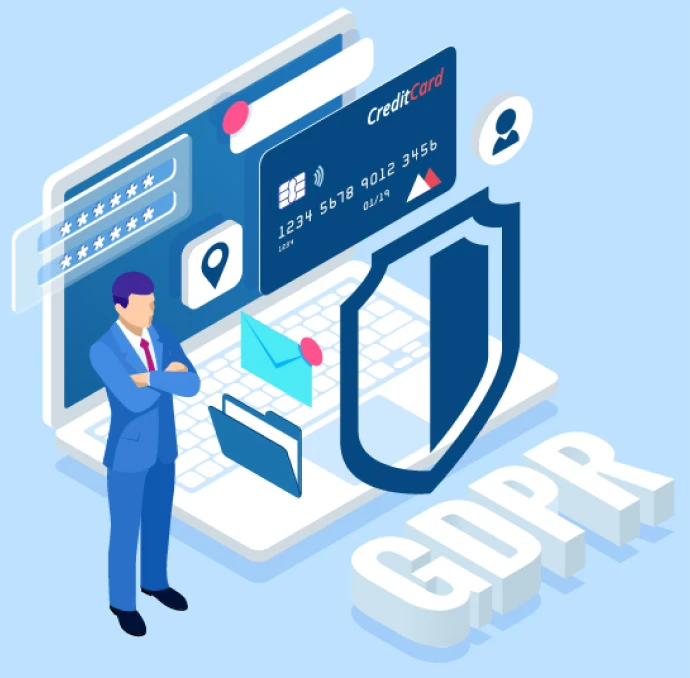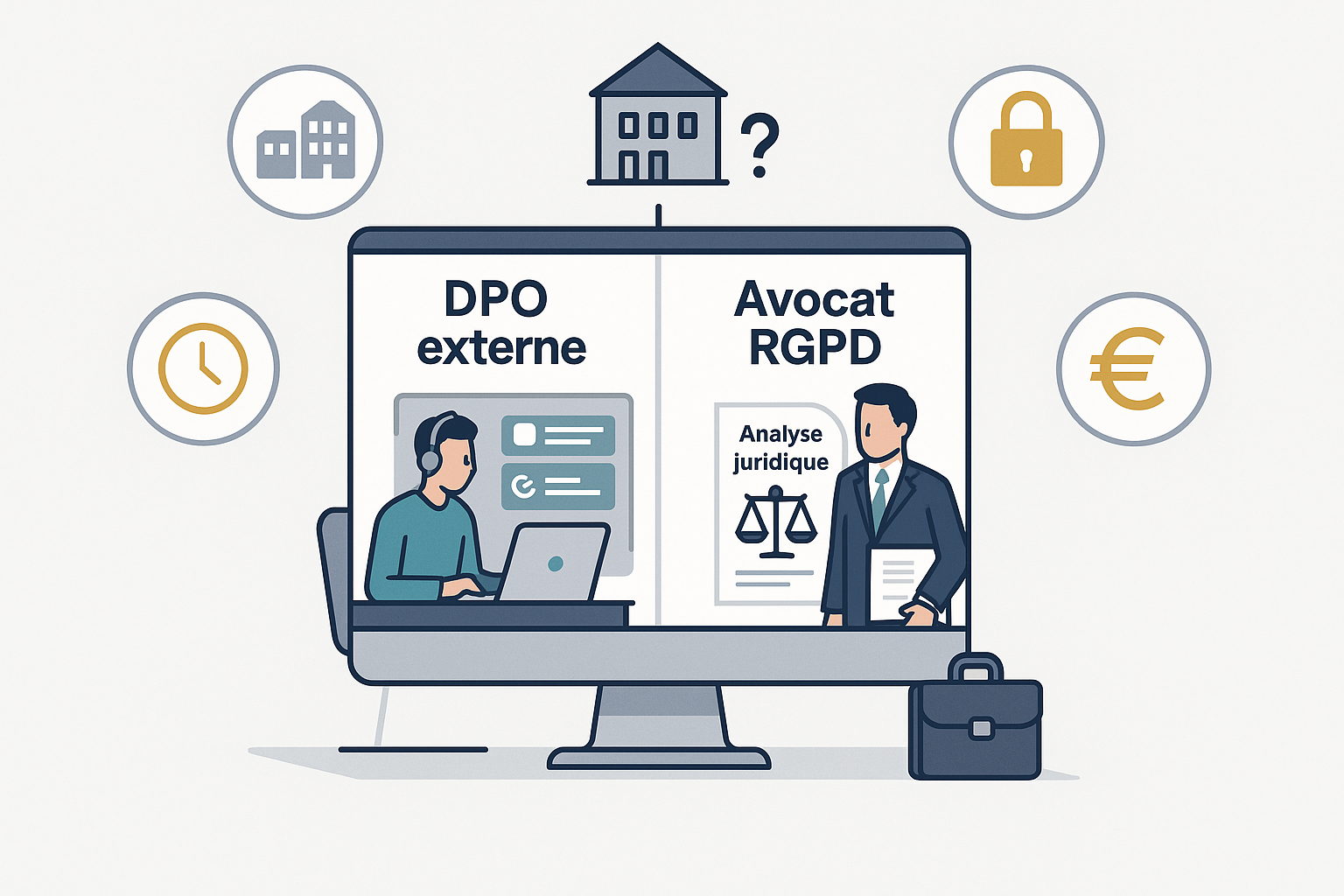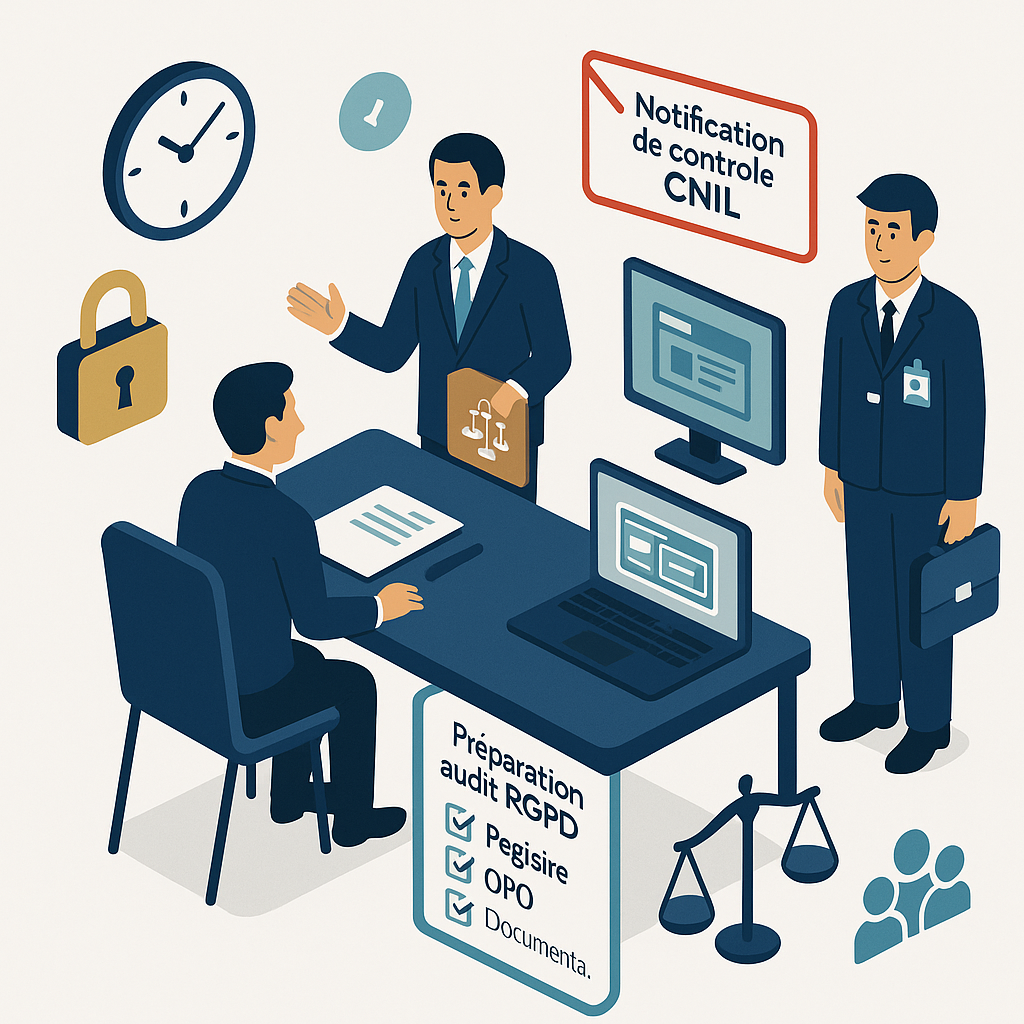
Conformité RGPD : ce qui a changé en 2025
Conformité RGPD en 2025 : Depuis sa mise en application en 2018, le RGPD n’a
La gestion des données personnelles est au cœur des obligations réglementaires pour les entreprises. La CNIL veille au respect des lois sur la protection des données, et la non-conformité peut entraîner des sanctions lourdes. Il est essentiel d’assurer une conformité rigoureuse pour protéger votre activité et éviter des pénalités sévères.

La Commission Nationale de l’Informatique et des Libertés (CNIL) est l’autorité de référence en matière de protection des données en France. En tant qu’entreprise, respecter les exigences de la CNIL vous permet de protéger les données personnelles de vos utilisateurs et de renforcer la confiance de vos clients.
Le Règlement Général sur la Protection des Données (RGPD), conjointement avec la loi Informatique et Libertés de 1978 mise à jour, représente une avancée décisive dans le paysage de la réglementation de la confidentialité et de la sécurisation des données personnelles en Europe.
Établissant des standards rigoureux, il vise à renforcer et unifier la sécurité des données à caractère personnel pour les individus, tout en offrant aux entreprises un cadre clair pour la conformité.

Nous plongeons au cœur de vos opérations pour identifier et évaluer le niveau de conformité RGPD à date.
Notre approche méthodique examine vos processus de collecte, de traitement et de stockage des données, vous fournissant un rapport détaillé et des recommandations personnalisées pour renforcer votre conformité.

Après une analyse approfondie, nous élaborons un plan d’action (de mise en œuvre) sur mesure pour intégrer les principes du RGPD dans votre activité quotidienne.
De l’adaptation de vos politiques de confidentialité à la mise en place de protocoles de sécurité des données, nous vous accompagnons pas à pas pour assurer une transition en douceur vers la pleine conformité.
Nous pouvons notamment réaliser :

Conscient que la conformité RGPD est un engagement continu, nous offrons des programmes de formation interactifs pour vos équipes.
Ces sessions sont conçues pour sensibiliser vos employés aux enjeux de la protection des données et les doter des compétences nécessaires pour appliquer les meilleures pratiques en matière de confidentialité.

Le RGPD évolue, et votre entreprise aussi.
Nous vous proposons un service de veille réglementaire pour vous tenir informé des derniers changements.
De plus, grâce à nos audits de conformité périodiques, nous vous aidons à maintenir et à améliorer continuellement vos standards de protection des données personnelles.

La non-conformité à la CNIL expose les entreprises à des risques juridiques et financiers importants.
En France, la CNIL joue un rôle central dans l’application du RGPD, ayant le pouvoir de sanctionner sévèrement, imposer des injonctions de mise en conformité et même de recourir à des astreintes journalières.
De surcroît, la procédure accélérée permet au président de la formation restreinte de la CNIL d’agir rapidement en prononçant des rappels à l’ordre, des amendes jusqu’à 20 000 €, ou des injonctions sous-astreinte, ce qui souligne la nécessité vitale pour les entreprises de s’assurer une conformité rigoureuse et continue.

Conformité RGPD en 2025 : Depuis sa mise en application en 2018, le RGPD n’a

Face aux exigences strictes du Règlement Général sur la Protection des Données (RGPD), les entreprises

La CNIL intensifie ses contrôles depuis l’entrée en vigueur du RGPD. Préparez-vous efficacement au contrôle
L’adoption du Règlement Général sur la Protection des Données (RGPD) a été un tournant significatif pour la protection des données personnelles en Europe.
Pour les entreprises souhaitant se conformer à cette réglementation, voici les six étapes essentielles à suivre pour une mise en place efficace :
Le Règlement général sur la protection des données (RGPD) constitue la colonne vertébrale de la législation sur la protection de la vie privée en Europe, et son champ d’application est à la fois vaste et précis.
Voici les entités concernées :
Cas particuliers à ne pas négliger :
Au sein d’une organisation, le respect des obligations RGPD est typiquement confié à une figure clé : le Délégué à la Protection des Données (DPO). Ce professionnel, obligatoire dans certaines entités publiques et entreprises selon des critères définis par le RGPD, est investi de la mission de surveiller l’application des règles relatives à la protection des données personnelles. Il offre un point de contact privilégié avec les autorités de contrôle, conseille l’entreprise sur les bonnes pratiques à adopter et s’assure de la sensibilisation et de la formation du personnel à ces enjeux.
Dans les organisations où la désignation d’un DPO n’est pas obligatoire, la responsabilité de la conformité RGPD peut être attribuée à un membre du personnel existant ou à un comité dédié à la protection des données. Celui-ci devra se tenir au courant de la législation en vigueur, évaluer de manière continue les risques associés aux activités de traitement de données, et mettre en œuvre les mesures nécessaires pour se conformer au RGPD.
Indépendamment de la structure choisie, il est crucial que la personne ou le groupe responsable dispose de connaissances suffisantes en matière de droit et de pratiques de protection des données, ainsi que d’une compréhension approfondie des processus opérationnels de l’organisation.
Notre cabinet d'avocats, spécialisé en conformité CNIL, offre une expertise pointue en matière de protection des données personnelles. Nous accompagnons nos clients tout au long du processus de mise en conformité avec les directives de la Commission Nationale de l'Informatique et des Libertés (CNIL). Nos services incluent l'analyse des pratiques de gestion des données, la réalisation des formalités requises, ainsi que la gestion des contentieux avec la CNIL.
Fort d'une expérience significative dans le domaine, notre équipe est composée d'experts juridiques dédiés à assurer la sécurisation et l'optimisation des traitements de données de nos clients. Nous mettons un point d'honneur à offrir une approche personnalisée, adaptée aux spécificités de chaque entreprise, qu'il s'agisse de PME, de grandes entreprises ou d'organismes publics.
Nous réalisons des audits complets pour identifier les écarts entre vos pratiques actuelles et les exigences légales, tout en proposant des solutions concrètes pour y remédier. Notre objectif est de vous permettre de gérer vos données en toute conformité, en minimisant les risques juridiques et en renforçant la confiance de vos partenaires et clients.
Notre cabinet commence par une analyse approfondie de la protection des données personnelles en lien avec les dispositions de la loi Informatique et libertés. Nous évaluons les processus de traitement des données de nos clients pour vérifier leur conformité avec les régimes d'autorisation, de déclaration ou de dispense applicables. Cette étape cruciale permet d'identifier les éventuelles non-conformités et de proposer des solutions adaptées pour y remédier.
Nous prenons en charge toutes les formalités administratives nécessaires auprès de la CNIL. Cela inclut la rédaction et la mise à jour du registre des traitements, indispensable pour prouver la conformité de vos pratiques. Nous assurons également la formation du Correspondant Informatique et Libertés (CIL), garantissant ainsi une gestion interne efficace et conforme des données personnelles. De plus, nous rédigeons les chartes informatiques et les chartes S.I adaptées aux besoins spécifiques de votre organisation, assurant une utilisation des systèmes d'information en conformité avec les règles en vigueur.
En cas de contrôle par la CNIL, notre cabinet vous accompagne pour gérer les contentieux et identifier les actions correctives à mettre en œuvre. Nous intervenons pour vous représenter et défendre vos intérêts, tout en minimisant les impacts juridiques et financiers potentiels. Notre expertise nous permet de vous guider efficacement à travers les procédures de régulation, assurant ainsi une résolution rapide et conforme aux exigences légales.
Notre cabinet propose des missions d'audit spécifiques pour évaluer la conformité de vos pratiques juridiques à la réglementation en vigueur. Nous effectuons des analyses détaillées de vos processus internes, notamment au sein des établissements de santé, pour vérifier leur alignement avec les exigences légales et réglementaires. Ces audits permettent d'identifier les écarts entre les pratiques actuelles et les standards requis, et de formuler des recommandations précises pour atteindre la conformité.
À l'issue de chaque mission d'audit, nous fournissons un rapport détaillé présentant les résultats de notre analyse. Ce rapport inclut des préconisations concrètes pour corriger les non-conformités identifiées et améliorer vos pratiques. Nous organisons également des séances de restitution pour discuter des conclusions de l'audit et des actions à mettre en œuvre. Notre approche se veut collaborative, visant à transformer ces audits en véritables outils de sécurisation juridique et de performance pour votre entreprise.
Dans un monde où les données sont devenues un atout stratégique, notre cabinet aide ses clients à se conformer aux contraintes juridiques liées à la collecte et au traitement des données. Nous veillons à ce que chaque étape, de la collecte à l'exploitation des données, soit conforme aux réglementations nationales et européennes, notamment le RGPD (Règlement Général sur la Protection des Données). Nos experts évaluent la finalité des traitements envisagés et vous accompagnent pour garantir que vos pratiques respectent les normes en vigueur, minimisant ainsi les risques de non-conformité.
La sécurisation des données est un enjeu majeur pour toute organisation manipulant des informations sensibles. Notre cabinet propose des solutions sur mesure pour protéger vos données contre les menaces potentielles. Nous aidons à l'élaboration de politiques de sécurité, à la mise en place de mesures techniques et organisationnelles adaptées, et à la formation de vos équipes pour garantir une gestion sécurisée des données. Grâce à notre expertise, vous pouvez renforcer la confiance de vos clients et partenaires tout en respectant les obligations légales en matière de protection des données.
La conformité CNIL est une exigence incontournable pour toute organisation manipulant des données personnelles. En vous appuyant sur notre expertise, vous assurez une gestion sécurisée et conforme de vos informations, minimisant ainsi les risques juridiques et renforçant la confiance de vos partenaires et clients. Nous nous engageons à vous accompagner tout au long de ce processus, en vous proposant des solutions personnalisées et adaptées à vos besoins spécifiques. Notre objectif est de vous aider à transformer les contraintes réglementaires en véritables opportunités de développement et de performance.